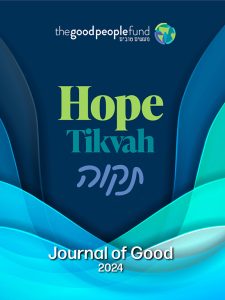‘Lone soldiers’ offer a lesson in giving
August 27, 2014 – Johanna Ginsberg, New Jersey Jewish News
New tzedaka syllabus is inspired by work of Israeli ‘mitzva hero’
When two “lone soldiers” were killed this summer during Israel’s conflict with Gaza, Robyn Faintich knew it was the right time to release the first installment of the Good People Fund’s new curriculum.
The lesson plans, which help Jewish educators teach about tzedaka, include profiles of grassroots philanthropists who receive support from the Millburn-based fund.
Tzvika Levy, a retired IDF paratrooper, is among those profiled. His “Lone Soldiers” project provides support for young immigrant soldiers who do not have immediate family in Israel. Levy offers them tips for navigating life in Israel, brings gifts to swearing-in ceremonies, and provides material comfort in the form of hot plates, televisions, fleece jackets, and the like.
In general, Levy helps the hayalim bodedim, as they are called, find a community in Israel, often literally.
During the 60-90 minute “Grab ’n’ Go” lesson plan devised by GPF, participants break into small groups and are asked to allocate limited resources to meet the soldiers’ needs. The lesson addresses various Jewish concepts, including Treating a Stranger, Welcoming Guests, and Responsibility to Others.
Naomi Eisenberger of Millburn, GPF’s director, said a gift from a private donor helped her hire Faintich, a Jewish values education specialist, to update an older tzedakacurriculum, developed in 1998, called Ziv Giraffe (named for the animal that “sticks his neck out” to help others).
Eisenberger said the goal of GPF is not just to raise money and make grants to grassroots do-gooders, but to teach others how they can start “repairing the world.”
“This was the last pole of the tent I felt I needed to put in place,” she said of the curriculum.
Describing Ziv Giraffe, Faintich said, “This curriculum is fantastic for the decade it was written in. But there’s no technology. It talks about taking cassette recorders to nursing homes to play music for residents. And it features [tzedaka] heroes like Paul Newman, who kids today know only as the face on their salad dressing.”
Faintich, founder of the Atlanta-based education consulting firm Jewish GPS, said the new curriculum will include not only social media but also a section on service learning and a much deeper focus on Jewish text study. “The curriculum will build on itself in scope and sequence,” she said.
The first lesson is already available. Other “mitzva heroes” to be profiled are Susie and Everett Duncan of McRoberts, Ky., who are at the center of an effort to bring resources to their home community in rural Appalachia, and Sunday Friends in San Jose, Calif., a school-based program helping poor families break the cycle of poverty.
Faintich is developing each unit for easy adaptation in a broad array of settings, including family education, youth groups, a summer camp lesson, a day school program, and a Shabbat morning study.
The units, which are designed to be led by just about anyone, provide details like supplies needed, time estimates for each section, discussion questions, and optional additional activities for different age groups.
“The purpose is to hear a story about a good person and then have students say, ‘If they did that, I can too,’” said Eisenberger.
About 2,800 soldiers are serving in the Israeli military despite not growing up in the country, according to the Lone Soldiers Program, a project of the Friends of the Israel Defense Forces, which provides them with social and other services. (The FIDF program and Levy’s project are not related.)
Locally, a chapter of the Lone Soldier Center, another group supporting families of lone soldiers, has formed in West Orange.
Three hayalim bodedim have died in the current conflict with Hamas: Texas native Sean Carmeli, Californian Max Steinberg, and French immigrant Jordan Bensemhoun.
http://njjewishnews.com/article/24395/lone-soldiers-offer-a-lesson-in-giving





